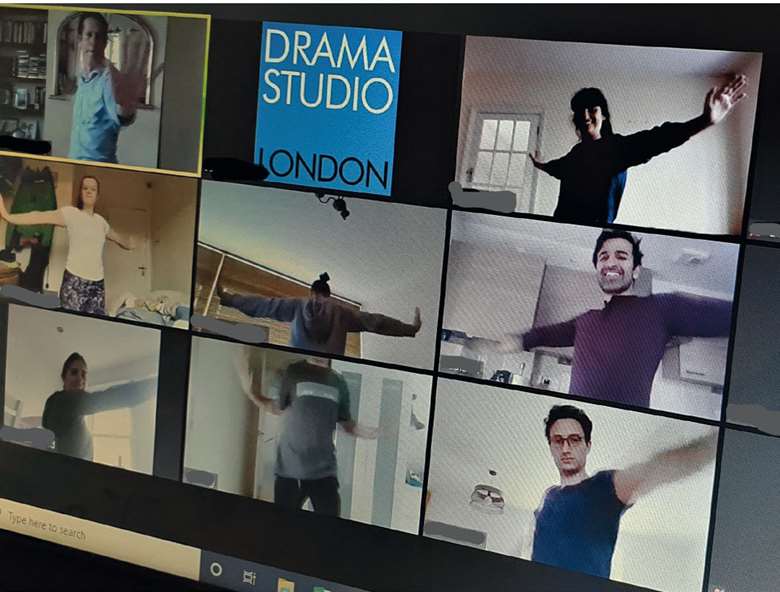Reaching out while staying in
Susan Elkin
Tuesday, September 1, 2020
Regular Expo exhibitors Nick Hern Books and Broadway Licensing have both made special online licenses available so that you and your students can ‘stage’ remote productions. Susan Elkin finds out more

FEDERATION OF DRAMA SCHOOLS
Schools, youth theatres and other non-professional performance companies have been some of the hardest hit by the government's Coronavirus guidance which, at present, precludes live theatre.
Such groups seem to have fallen well below government and public radar – so what happens to school productions, which are such a key part of personal development for thousands of young people every year?
Just as many professional companies have done this year, the answer is probably to exploit technology in order to preserve the performance tradition and experience. And Stratford Girls’ Grammar School – a selective school with sixth form – at Shottery, near Stratford-upon-Avon has demonstrated an interesting, collaborative way of working this summer.
Year 12 A Level drama students were each asked to keep a diary of their initial lockdown experiences to share with each other during group video calls which also enabled them to edit scripts. The idea is to produce the devised play the curriculum requires when they get back to school. The girls have received messages of support from directors such as Dominic Cooke and Alexi Kaye Campbell as well as a video in which Jacqui O’Hanlon, RSC's Director of Education, shared her experience of what makes an exciting piece of theatre.
If on the other hand, you want to perform a pre-written show or musical then avenues are opening up for the non-professional sector.
Nick Hern Books, for example, is now offering discounted licences both for live-streamed productions and broadcasts of recorded productions for a selected range of the plays it publishes. For £60 (or less for a shorter play) for each live performance or day that the production remains online, you can ‘stage’ works by playwrights such as Mike Bartlett, David Edgar, Jessica Swale and Polly Teale.
So how did they choose which plays? NHB Managing Director Matt Applewhite chuckles: ‘We set out to make every title we publish available for online performance, though that hasn't always been possible because of existing rights arrangements with agents and producers.’
For Broadway Licensing, the decision was pragmatic. Having decided that they wanted to develop a list of shows available on licence for amateur digital performance, it was a case of how to get it done as quickly as possible. ‘We needed new shows or adaptations which would be specific to tools such as Zoom,’ says Brendan Conheady, ‘so we worked with a group of writers we knew would be able to turn it round in three weeks.’
Both NHB and Broadway Licensing report high levels of interest. ‘From the day we announced that online performance would be possible, we've had lots of interest – both from those looking to go ahead with a previously licensed production that would now need to happen online, and also from schools, youth theatres and others keen to explore this way of continuing to make drama while social distancing is in place,’ says Jon Barton, marketing manager at NHB.
‘It has gone way beyond schools,’ agrees Conheady. ‘We're now seeing lots of applications from amateur theatre groups as well. And it isn't just full length shows either. One-act plays are useful for festivals and competitions.’
So, are digital shows going to be a 2020 phenomenon which will disappear as quickly as they emerged once theatres reopen? Conheady thinks not: ‘We're anticipating long-term need and potential to develop this further,’ he says. ‘People are getting more and more used to looking at screens. It's a lot cheaper to do it this way than it is to hire a theatre, and it enables young people in particular to access new material at a fraction of the cost.’
Conheady also argues that there's a need for streaming rights anyway, to enable – for example – grandparents on the other side of the country to see the show even when it's conventionally staged. He sums up: ‘It's a way of giving more students more opportunities and, above all, more content.’
It is also a fine thing for playwrights for their work to find other outlets during this period of theatrical darkness. Amanda Whittington who wrote, among many other plays, Be My Baby and Ladies’ Day, is associate artist at Nottingham Playhouse. Her work, published by NHB, is popular with amateur companies. ‘This is a very exciting move for the amateur sector,’ she says. ‘Online performance means companies can continue to bring more work to their audience and find innovative ways to produce it. I'm delighted that my plays will be out there.’
It all comes down to imaginative, open-minded innovation at a difficult time – from sixth form students devising and collaborating in lockdown to a big amateur company wanting to stage online After Midnight, Glory Days, My Boy Jack, The Railway Children – or dozens of other options.
While acknowledging that the lockdown experience can feel isolating and demotivating, O’Hanlon talks of a parallel ‘explosion of colour.’ She says: ‘We have never seen as many creative responses being made and shared by individuals, families, friends and strangers. The instinct to make for community is keeping us going and reminds us of the important role that theatre and arts have in making sense of our lives and the world we live in.’
Rights for productions can be purchased from:
Nick Hern Books www.nickhernbooks.co.uk
Broadway Licensing www.broadwaylicensing.com
MTI Europe www.mtishows.co.uk

